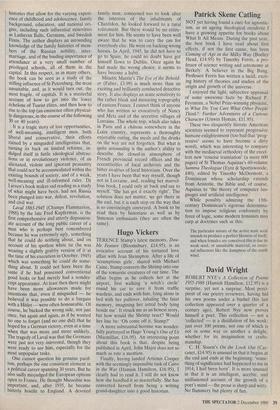Patrick Skene Catling
NOT yet having found a cure for agnostic- ism, as an ageing theological recidivist I have a growing appetite for books about What It All Means. During the past year, the best book I have read about first effects, if not the first cause, has been Coming of Age in the Milky Way (Bodley Head, £14.95) by Timothy Ferris, a pro- fessor of science writing and astronomy at Berkely. A believer in the Big Bang, Professor Ferris has written a lucid, excit- ing history of theories and studies of the origin and growth of the universe.
I enjoyed the light, subjective appraisal of some awesome facts by Richard P. Feynman, a Nobel Prize-winning physicist, in What Do You Care What Other People Think?: Further Adventures of a Curious Character (Unwin Hyman, £11.95).
These two eloquently literate American scientists seemed to represent progressive humane enlightenment (too bad that 'prog- ressive' seems to have become a dirty word), which was interesting to compare with the mediaeval orthodoxy of the excel- lent new 'concise translation' (a mere 600 pages) of St Thomas Aquinas's 60-volume Summa Theologiae (Eyre & Spottiswoode, £40), edited by Timothy McDermott, a Dominican whose scholarship extends from Aristotle, the Bible and, of course, Aquinas to 'the theory of computer lan- guages and artificial intelligence.'
While possibly admiring the 13th- century Dominican's rigorous determina- tion to impose religious conformity by force of logic, some modern feminists may carp at doctrines such as this:
The particular nature of the active male seed intends to produce a perfect likeness of itself, and when females are conceived this is due to weak seed, or unsuitable material, or exter- nal influences like the dampness of the south wind.










































































 Previous page
Previous page